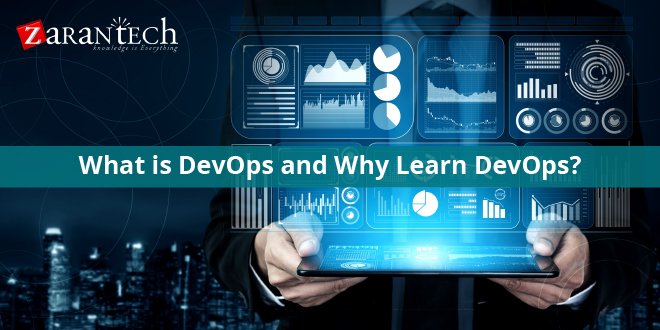What is DevOps and Why Learn DevOps?
Category: DevOps Posted:Aug 06, 2020 By: Alvera Anto
What is DevOps?
DevOps can be labeled as brothers in conflict or two faces of the same coin. It is the latest trend in software development, where programmers work in tandem with the operations team to make sure that the software program runs successfully with no glitches. Today, lots of software development teams are going the DevOps way, which is not only aiding organizations to handle the pressure to develop high-quality code but also helping them deliver faster.
According to Wikipedia, DevOps is a portmanteau of ‘development’ and ‘operations’ is a concept managing other points like software development, operations, and solutions. It highlights communication, collaboration, and integration between software developers and information technology (IT) operation employees. This 2019 Technical Skill Report explains the rise in demand for DevOps Certification.
Let us look at how Dev and Ops function:
Dev wants:
- Continual Changes
- Include new attributes
Ops want:
- Constant Stability
- Create new solutions
The Trouble
In supplying useful software to consumers, usually, development and operations remain in conflict with each other. While development wants to deliver its modifications (for example, new functions) to clients promptly, operations want stability, which means not altering the manufacturing systems too often.
The gap between development and operations occurs on different levels:
- The remuneration void: Results of different goals of development and operations.
- The procedure gap: Results from different strategies of development and operations and how to handle the changes, bring them to production and maintain them there.
- The tools gap: Results from the truth that development, and operations, typically use their tools to do their job.
Therefore, growth and operations frequently act like silos, as they are 2 unique teams.
Development and Operations in Conflict
The dispute between development and operations is as follows:
- Need for Change: Development results in change(as an example, new attributes, bug repairs, etc). It desires the changes to promptly roll out to production.
- Fear for Change: Once the software program is delivered, the operations department avoids making changes to ensure the stability of the software.
Is DevOps the solution?
DevOps links software application development and operations. It also bridges the gap between agile software development and operations experiences. All specialists have at least a basic understanding of other business subjects.
Why DevOps?
DevOps is not a methodology or framework, it is a set of principles to break down silos. Particularly, DevOps is all about culture, automation, measurement, and sharing (CAMS):.
Culture:
In culture, individuals and processes come first. If you don’t have a culture, all automation efforts will be unproductive. The relationship is important in culture. Its features include:
- Engage early, engage often
- Damage silos.
- Be open to options
- Stop denouncing
Other features of culture are:
- Communicate with peers.
- Involve everybody in core processes and choices.
- Ask questions.
- Never say never.
- Daily stand-ups (invite everyone)
Automation:
As soon as you understand your culture, you can start with automation. Now, you can finalize different tools to achieve automation for DevOps. Tools for release management, provisioning, configuration management, systems integration, monitoring and control, and orchestration becomes an important aspect for DevOps.
Why Automation?
- Machines are good at doing the same task over and over again.
- Consistent and known state.
- Quick and reliable.
- Saves a lot of time– 10 mins/day = 2.53 days/year.
What can be automated?
- Builds
- Implementations
- Testing
- Monitoring
- Self-healing
- System rollouts
- System configuration
Measurement (Metrics)
If you can’t measure, you can’t enhance. An effective DevOps execution will measure everything it can as often as it can:
- Performance metrics, procedure metrics, and people metrics.
- Capture, learn, improve helps in:
- Capacity Planning.
- Trend analysis
- Fault Finding.
- Simple as saving Tomcat access info
- Plotted on a graph over time
Sharing:
Sharing is the loopback in the CAM cycle. Developing a culture where individuals share ideas and issues is important. Expressing ideas can create great open feedback that in the end helps to:
- Improve
- Share Suggestions
- Share metrics
- Ops: Provide devs shell access
- Devs: See what innovation can be leveraged
DevOps Lifecycle
Utilizing a DevOps lifecycle, items can be continually deployed in a comments loophole through:
- Infrastructure Automation
- Configuration Management
- Deployment Automation
- Infrastructure Management
- Log Management
- Application and Performance Management
Reasons to learn DevOps
DevOps has proved to be an efficient technique and helps in boosting business growth:
Technical benefits:
- Continuous software delivery
- Less complex problems to fix
- Faster resolution of problems
Business advantages:
- Faster delivery of functions
- More stable operating environment
- More time available to add value (rather than fixing/maintain)
DevOps tools
1. Operating Systems
- Linux (RHEL, CentOS, Ubuntu, Debian).
- Unix (Solaris, AIX, HP/UX, etc.).
- Windows
- Mac OS X
2. Infrastructure as Service
- Amazon Web Solutions
- Rackspace
- Azure
- OpenStack
3. Virtualization Platforms
- VMware
- VirtualBox
- Vagrant
4. Containerization Equipment
- LXC
- Docker
5. Linux OS Installation
- Kickstart
- Cobbler
6. Configuration Management
- Puppet
- Chef
- Ansible
- RANCID
7. Test and Build Solutions
- Jenkins
- Virtuoso
- Ant
8. Application Deployment
- Capistrano
9. Application servers
- JBoss
- Tomcat
- Jetty
- Glassfish
10. Web Servers
- Nginx
- Apache
11.Queues, Caches, and so on
- ActiveMQ.
- RabbitMQ.
- Memcache.
12. Databases
- Percona Server
- MySQL
- PostgreSQL
- MongoDB
- Cassandra
- Redis
- Oracle
- MS SQL
13. Monitoring, Alerting, and Trending
- New Relic
- Nagios
- Graphite
- Ganglia
- Cacti
- PagerDuty
14. Logging
- PaperTrail
- Logstash
- Loggly
- Splunk
15. Process Supervisors
- Monit
- Runit
- Manager
- God
16. Security.
- Snorby Danger Stack
- Tripwire
- Snort
17. Miscellaneous Tools
- Multihost SSH Wrapper
- Code Environment
Go through our DevOps Interview Questions to crack the Interviews.
Conclusion
Got an inquiry for us? Discuss them in the comments section and also we will certainly get back to you. If you wish to learn and enhance your knowledge in DevOps you’re in the right place. At ZaranTech we offer a self-paced online training program for DevOps. Also for more informative and engaging blogs visit our website.
Check out this insightful video on DevOps Tutorial for Beginners:





 99999999 (Toll Free)
99999999 (Toll Free)  +91 9999999
+91 9999999